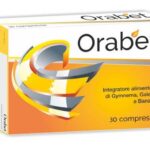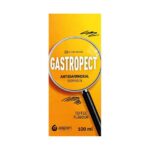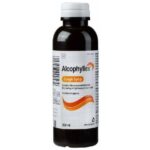Sinupret: Uses, Dosage, Side Effects, Price
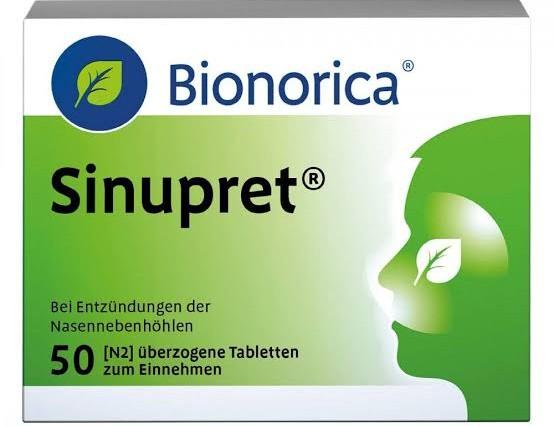
What is Sinupret?
Sinupret, manufactured by Bionorica, Neumarkt, Germany and imported into the United States by Bionorica, LLC. It is a unique herbal combination used to treat sinusitis or acute and chronic bronchitis.
Sinupret contains extracts of 5 herbs: elder (Sambucus nigra, Caprifoliaceae) flowers, primrose (Primula veris, Primulaceae) flowers with calyx, common sorrel (Rumex acetosa, Polygonaceae) herb, European vervain (Verbena officinalis, Verbenaceae) herb, and gentian (Gentiana lutea, Gentianaceae) root.
Sinupret has been sold in the German and European market for more than 70 years. Sinupret was ranked as the second most prescribed phytotherapeutic agent used for cough and cold in Germany in 2006, 2007, and 2008. It was also ranked #1 as the most popular cough and cold remedy chosen by self-selection and self-medication in Germany in 2006, 2007, and 2008. Sinupret was ranked #10 of all products prescribed by physicians, including all prescription medicines, in Germany in 2003.
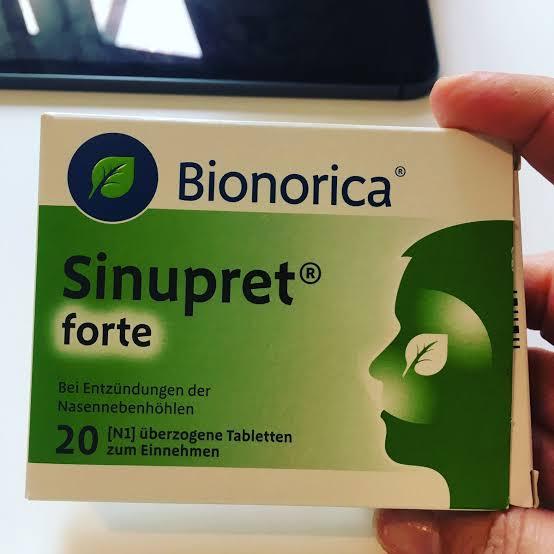
How to Use Sinupret
In Europe, 3 products are available: Sinupret Drops, Sinupret Sugar Coated Tablets, and a tablet containing a higher concentration of the herbs called Sinupret Forte Sugar Coated Tablets. In the fall 2008, the products have been available in the United States in mainstream retail outlets, sold under the trade names Sinupret Plus/Sinupret Adult Strength and Sinupret Syrup for Kids. Sinupret Plus/Sinupret Adult Strength has the same formulation as Sinupret Forte Sugar Coated Tablets and Sinupret Syrup for Kids is similar to the Sinupret Drops except that the Syrup has much lower alcohol (ethanol) content.
Alcohol (ethanol) is used in the manufacturing process as a solvent to make the extract from the 5 botanical ingredients, in a quantity sufficient to extract the pharmacologically active volatile essential oils from the respective herbal constituents. The manufacturer claims that there should be no effect on the blood alcohol content after taking Sinupret Syrup at the recommended doses. They draw this conclusion from the fact that fruit juice contains naturally occurring ethanol (< 0.1-0.5% by volume) and that the intake of alcohol associated with Sinupret Syrup is comparable, or smaller, than the intake with fruit juice. Also, there are reports that show that blood alcohol concentrations after intake of very small amounts of alcohol are insignificant or irrelevant.
The doses used in the clinical trials use the manufacturer’s recommended dose. All of the studies used the European products.
Sinupret Forte Sugar Coated Tablets: Adults—1 tablet, 3 times per day
Sinupret Drops: Adults—50 drops, 3 times per day, Children (6-12 years)—25 drops, 3 times per day, Children (2-6 years)—15 drops, 3 times per day
In clinical trials the duration of treatment varied from 7 to 21 days.
Manufacturer dose recommendations: According to the manufacturer, the dosing for the US products are as follows:
- Sinupret Plus/Sinupret Adult Strength: 1 tablet, 3 times per day.
- Sinupret Syrup for Children: 2 to 5 years old— ½ teaspoon or 2.1 mL, 3 times per day, 6 to 11 years old— ¾ teaspoon or 3.5 mL, 3 times per day, 12 years or older—1½ teaspoons or 7.0 mL, 3 times per day.
Contraindications and Precautions
Consumers and patients who know they are hypersensitive (allergic) to one of the ingredients in the Sinupret products should exercise caution before using Sinupret. Due to lack of clinical data, Sinupret Plus/Sinupret Adult Strength and Sinupret Forte Sugar Coated tablets should not be used by children younger than 12 years old. Children younger than 12 years old can use the liquid form, Sinupret Syrup for Kids.
Can I take Sinupret during pregnancy or breastfeeding?
Sinupret use in pregnancy and lactation has not been fully studied and should be used only after careful risk-benefit evaluation by a patient’s physician or other appropriate healthcare provider.
What are the side effects of Sinupret?
Sinupret has been safely used in millions of doses over 35 years. Reported side effects include gastrointestinal (GI) disorders and allergy reactions. In these cases, intake of Sinupret should be discontinued and a physician should be consulted. At the first sign of an allergy reaction, Sinupret should not be taken again. According to the manufacturer, the incidence of adverse drug reactions in clinical trials is 1%, based on 6849 patients. The incidence of spontaneous adverse drug reactions in the period from 1973 to October 2008 is approximately 1 per 1,000,000 treatments, based on the sum of approximately 214 million treatments.
What drugs can Interact with Sinupret?
To date there are no known drug interactions with Sinupret. Tobacco smoking should be discontinued during bronchial infection and use of Sinupret because smoking lowers its efficacy.
Sinupret Price
The Average price of Sinupret starts from $18.07 here on Amazon depending on the product type.


